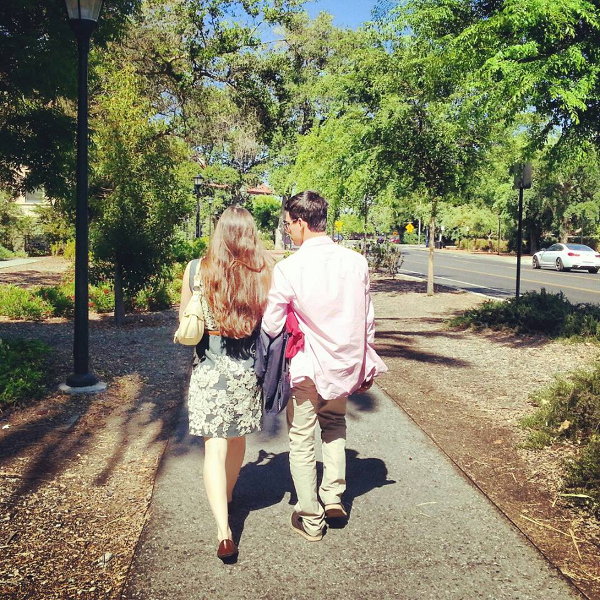The article my cousin Trisha sent me yesterday made me think again about how thankful I am our children were not subjected to government school. The article is a nice one about some really positive things that happened at a public high school in Utah. Still, these kinds of feel good stories are the exception, not the rule. We remain grateful to the Albany Public School system in Oregon for providing our children with such a horrific educational experience that we were motivated to pull them out and homeschool them. In thinking and reading about this I ran into a great blog post on the whole homeschool socialization thing.
Early in our journey of homeschooling a friend pointed out to me that if your child does not know Spanish, you do not put her in a large group of other people who do not know Spanish and expect them to learn Spanish from each other. Yet we say that children need to learn ‘socialization’ from each other- we stick children into a peer group of immature individuals who admittedly are not socialized and not skilled in the graces of getting along with one another and say they are there to learn those skills from each other. We’ve been doing this so long that the results of this seem normal and healthy to us as a culture- while they may be ‘normal,’ I want something better for my family and do not consider the typical age based model of social interaction and its results to be the standard I am aiming for.
The author of this blog post really nails it. This was our experience, too. Even though we do not believe our kids are any brighter than the bulk of kids that go to “Big State U”, they have had a great social and academic experience there and are scheduled to graduate with STEM degrees this spring. This has given me cause to reflect on exactly what is described in this blog post. We believe the powerful socialization aspects of our children’s homeschool experience uniquely prepared them for entry to into college at an early age and the ability to perform well after they got there.
When the kids transfered from the local community college to the local Big State U, they were saddened to see their fellow incoming freshmen herded into dorm settings, orientations, and entry level classes where they were patronized and treated like children for another year. This special treatment was provided to them to give them a more gentle opportunity to transition from government school to the real, “real world” of college. Of course, whether college is the real, “real world” is debatable, but many if not most of them did not make it.
There are remedial classes, tutors, study sessions, and a plethora of other mechanisms to help students overcome the abysmal education they received at the hands of their unionized, government school teachers . These kids are not different from any other kids around the world. They are bright. The did well enough on the SAT/ACT to get accepted into Big State U, so it is certainly not the case that they have defective minds. Really, they seem to be smart enough and are provided with sufficient help to thrive, but they do not.
Our kids feel the reason many students fail or embrace diminished opportunity is because they can not handle the social aspects of the real world. Or it could be that they are at college for the college social experience rather than an education. So after all the special help afforded to them because they are neither socially nor academically prepared, they either drop out of their STEM degrees to pursue Communications, English, Sociology, or Psychology degrees that do not lead to good jobs or they just drop out.
I have talked to the kids about this a lot. We really do not think our children are brighter than other kids at Big State U. They have to study very hard and it is not easy for them. What is different about their preparation than that of their government school peers? They honestly believe the powerful socialization experience they received during homeschool gave them an advantage. Like other homeschoolers, they did sports, music, art, church, and a bunch of other stuff out of the house. There were large and small group activities and activities with people of different ages, ethnicities, and languages. They were not confined to a single room with a fixed group of same-age kids guided by one or two adult supervisors in a truly artificial social setting year after year after year. They traveled more because they were not subject to government school schedules and budgets.
When they were fourteen, they took classes at the community college with Iraq War vets using the GI bill to go to college, housewives trying to finish a degrees in nursing or accounting, dual-enrolled students from the local government schools, other homeschool students, people working menial jobs trying to improve their lot in life of a wide range of ages, recent high school graduates who did not have good enough grades to get into college, and retired people taking a class just because they were interested to learn something new. That is the real world.
That is why their sheltered homeschool experience was more “real-world” than anything that happened in the government schools. It is why they were better prepared for what they would face at Big State U. It is also why I cringe whenever I see young mothers send their children off to pre-schools and kindergartens. It is the first step in road that provides serious social and academic roadblocks for their children.

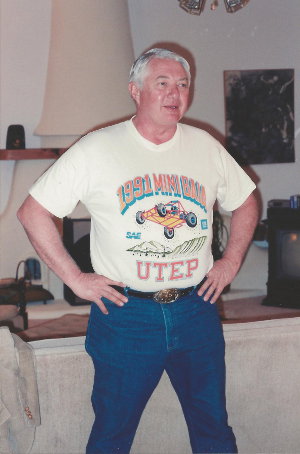 The guy in the photo is Dr. Carroll Johnson, my thesis advisor from my Masters degree at the University of Texas at El Paso. I would like to take credit for figuring out that it would be a good move to get a Masters degree, but the truth is that it happened for a lot of little reasons and at least two big reasons. I like to think God had has hand in it. The first reason that I decided to go back to school was that my company, Intelledex, got bought by a much bigger company and wanted me to move from Corvallis to Portland, Oregon. I was really a small town boy so that did not set well with me, so I started looking around.
The guy in the photo is Dr. Carroll Johnson, my thesis advisor from my Masters degree at the University of Texas at El Paso. I would like to take credit for figuring out that it would be a good move to get a Masters degree, but the truth is that it happened for a lot of little reasons and at least two big reasons. I like to think God had has hand in it. The first reason that I decided to go back to school was that my company, Intelledex, got bought by a much bigger company and wanted me to move from Corvallis to Portland, Oregon. I was really a small town boy so that did not set well with me, so I started looking around. I received mixed reviews from my family on my
I received mixed reviews from my family on my 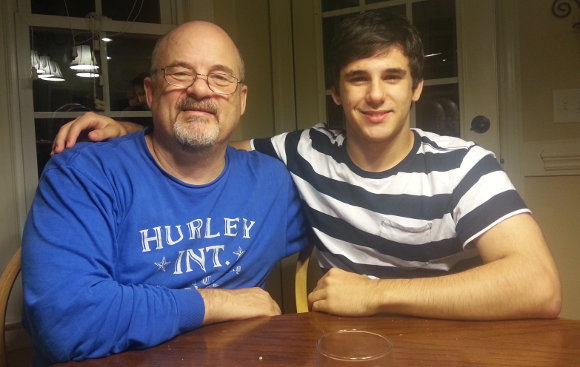
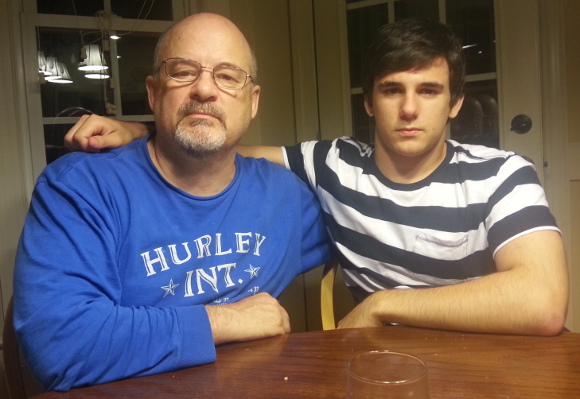
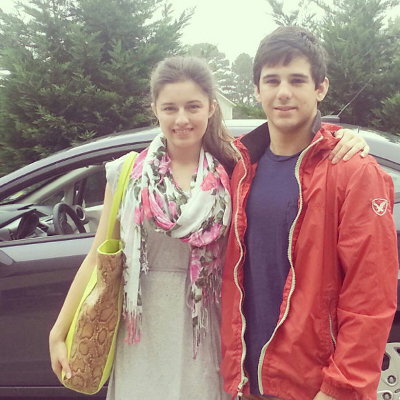 We all felt pretty nostalgic today. This picture is of Kelly and Christian just before they took off to NCSU for the first day of their Senior year at NCSU. Of course, Lorena had to take a picture. It was strange that they went through the same ritual as virtually every other year since they started school at age five by taking a trip to Target to buy new notebooks and writing instruments for all their classes. The main thing different this year is they have their own car so, for the most part, Lorena will not be driving them.
We all felt pretty nostalgic today. This picture is of Kelly and Christian just before they took off to NCSU for the first day of their Senior year at NCSU. Of course, Lorena had to take a picture. It was strange that they went through the same ritual as virtually every other year since they started school at age five by taking a trip to Target to buy new notebooks and writing instruments for all their classes. The main thing different this year is they have their own car so, for the most part, Lorena will not be driving them. Lorena’s first day of class was last Friday. Christian and Kelly’s first day of class is tomorrow. I got a timely reminder of what college is like yesterday afternoon when my buddy at work received the following text from his college Freshman son:
Lorena’s first day of class was last Friday. Christian and Kelly’s first day of class is tomorrow. I got a timely reminder of what college is like yesterday afternoon when my buddy at work received the following text from his college Freshman son: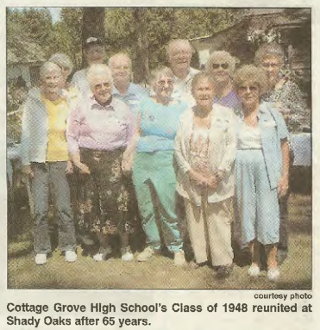 This picture arrived by email this morning. It is from the Cottage Grove Sentinel newspaper in Cottage Grove, Oregon. Grandma Sarah is the one on the left in the front row with the pink blouse. Grandpa Milo is two her right, behind her. The 65th Cottage Grove High School reunion took place last month. For those who do not know, Grandpa Milo was the student body president his senior year in high school.
This picture arrived by email this morning. It is from the Cottage Grove Sentinel newspaper in Cottage Grove, Oregon. Grandma Sarah is the one on the left in the front row with the pink blouse. Grandpa Milo is two her right, behind her. The 65th Cottage Grove High School reunion took place last month. For those who do not know, Grandpa Milo was the student body president his senior year in high school.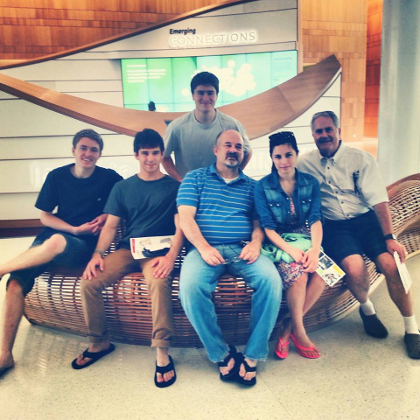 Kelly came back from her internship at the Johns Hopkins University-Applied Physics Laboratory just in time for a visit from the Larsons. They are dear homeschooling friends from Texas. Age-wise, the twin boys fall right between Christian and Kelly. That have gotten along famously since late elementary school. We spent a great weekend with them visiting the NCSU Hill Library and the North Carolina Museum or Art, playing games, talking, playing music, going to church, and generally just hanging out together. The Larson’s are great musicians–voice, violin/fiddle, accordian, piano–really they are amazing.
Kelly came back from her internship at the Johns Hopkins University-Applied Physics Laboratory just in time for a visit from the Larsons. They are dear homeschooling friends from Texas. Age-wise, the twin boys fall right between Christian and Kelly. That have gotten along famously since late elementary school. We spent a great weekend with them visiting the NCSU Hill Library and the North Carolina Museum or Art, playing games, talking, playing music, going to church, and generally just hanging out together. The Larson’s are great musicians–voice, violin/fiddle, accordian, piano–really they are amazing.